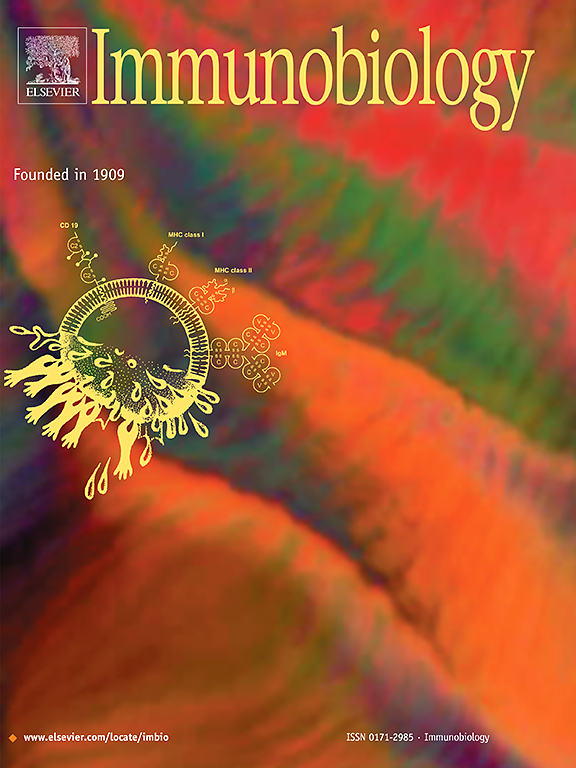LINC00461 promotes macrophage M1 polarization by inhibiting KLF4 transcription
IF 2.3
4区 医学
Q3 IMMUNOLOGY
引用次数: 0
Abstract
Background
Macrophage polarization is a complex process whereby macrophages differentiate into M1 (pro-inflammatory) or M2 (anti-inflammatory) phenotypes, mediating distinct and often opposing functions in immunity and tissue repair.
Methods
We analyzed LINC00461 expression in M1- and M2-polarized macrophages using qPCR. Functional assays (in vitro and in vivo) were performed to assess the effects of LINC00461 knockdown on cytokine secretion. RNA-seq, bisulfite sequencing, and chromatin immunoprecipitation (ChIP) were used to explore the mechanism involving Kruppel-like factor 4 (KLF4) and DNA methylation.
Results
LINC00461 levels were elevated in M1 macrophages and reduced in M2 macrophages. Knockdown of LINC00461 attenuated pro-inflammatory cytokine release (e.g., IL-1β, TNF-α) in M1 cells and promoted anti-inflammatory cytokine secretion (e.g., IL-10, TGF-β) in M2 cells. Mechanistically, LINC00461 knockdown upregulated KLF4 transcription, a key M2 polarization regulator. LINC00461 recruited DNA methyltransferases to induce hypermethylation of the KLF4 promoter, suppressing KLF4 expression and driving M1 polarization.
Conclusion
Our findings establish a functional link between LINC00461, KLF4 methylation, and macrophage polarization, providing insights into the epigenetic regulation of inflammatory responses.

LINC00461通过抑制KLF4转录促进巨噬细胞M1极化
巨噬细胞极化是一个复杂的过程,巨噬细胞分化为M1(促炎)或M2(抗炎)表型,在免疫和组织修复中介导不同且通常相反的功能。方法采用qPCR方法分析LINC00461在M1和m2极化巨噬细胞中的表达。通过体外和体内功能测定来评估LINC00461基因敲低对细胞因子分泌的影响。利用RNA-seq、亚硫酸盐测序和染色质免疫沉淀(ChIP)技术探讨Kruppel-like factor 4 (KLF4)和DNA甲基化相关的机制。结果M1巨噬细胞中linc00461水平升高,M2巨噬细胞中linc00461水平降低。敲低LINC00461可减弱M1细胞中促炎细胞因子(如IL-1β、TNF-α)的释放,促进M2细胞中抗炎细胞因子(如IL-10、TGF-β)的分泌。从机制上讲,LINC00461的敲低上调了KLF4的转录,这是一个关键的M2极化调节因子。LINC00461募集DNA甲基转移酶诱导KLF4启动子超甲基化,抑制KLF4表达并驱动M1极化。结论我们的研究结果建立了LINC00461、KLF4甲基化和巨噬细胞极化之间的功能联系,为炎症反应的表观遗传调控提供了新的见解。
本文章由计算机程序翻译,如有差异,请以英文原文为准。
求助全文
约1分钟内获得全文
求助全文
来源期刊

Immunobiology
医学-免疫学
CiteScore
5.00
自引率
3.60%
发文量
108
审稿时长
55 days
期刊介绍:
Immunobiology is a peer-reviewed journal that publishes highly innovative research approaches for a wide range of immunological subjects, including
• Innate Immunity,
• Adaptive Immunity,
• Complement Biology,
• Macrophage and Dendritic Cell Biology,
• Parasite Immunology,
• Tumour Immunology,
• Clinical Immunology,
• Immunogenetics,
• Immunotherapy and
• Immunopathology of infectious, allergic and autoimmune disease.
 求助内容:
求助内容: 应助结果提醒方式:
应助结果提醒方式:


